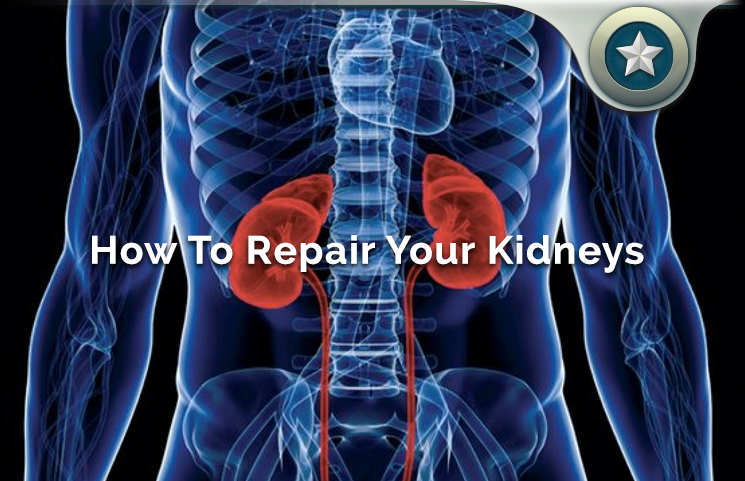Kidneys may be a pair of small bean shaped organs lying against the back muscles in the upper abdominal area, sitting opposite each other on both the left and right side of the body, but they play a very big role.
Kidneys, which are about the size of a fist, are located just below the lowest rib and mainly perform the work of filtering various toxins and chemicals from the blood to form urine. Blood circulates in and out of the kidney for filtration and removal of such toxins.
Through this duty, the kidney balances blood chemistry and also removes excess fluid and waste buildup from the blood and body. Kidneys therefore allow you to consume a wide range of drugs, products and fluids without worrying about chemical and toxin buildup.
Unfortunately, various conditions, inflammation and diseases may impact the kidney’s functionality and cause damages that daunt its role. There are three main categories of kidney damages that are known to affect many people. Fortunately, kidney damage is highlighted by various symptoms that can be perceived at early stages and allow for repair of the declining condition.

How Kidney Damage Affects The Body
Kidney damage occurs in three main levels:
- Acute renal failure
- Chronic kidney disease
- End-stage renal disease
All the three categories are potentially dangerous, especially since kidney damage impacts blood chemistry, filtration and waste regulation. The kidney removes excess water and toxic chemicals from the blood to establish a balance. Excess fluid in organs such as the lung, and toxins in the brain and heart can result in chronic diseases and death.
In fact, the end-stage renal disease signifies a stage where the kidney has deteriorated to a point where the person will die if prompt dialysis is not undertaken. Kidney damage simply refers to the sudden stop or decline of kidney functions due to disease, medical condition, medication or toxic poisoning, among others.
When the kidney is unable to filter all the harmful toxins and excessive fluid from the blood, these compounds and fluid will be circulated to all parts of the body including delicate organs like the brain, heart, and lungs.
Kidney damage can therefore cause a number of disorders in body processes and functions, as well as diseases. Some of the common symptoms that show up as a result of kidney damage include the following:
- Low urine output (decreased)
- Edema (swelling) caused by increased salt and water in the blood
- Nausea and vomiting
- Increased blood pressure
- Lethargy
- Headache, fatigue and weakness
- Thirst and poor appetite
- Paling skin and itching
- Stunted growth in children
- Bone damage in older patients
Some of these symptoms are shared by other diseases and will appear for different categories of kidney damage. However, it is advisable to seek immediate medical examination if you experience any of these symptoms. Finding means to repair kidney damage during the early stages will increase your chances of full recovery.
Most kidney damages are known to heal once the causing factor is eliminated through medication. In summary, kidney damage affects the process of waste and toxin elimination, which in turn results in more fluid and chemical buildup.
Top Causes Of Kidney Damage And Failure
Kidney damage can be a result of various different reasons and factors. Most forms of kidney damage can also be prevented. Some of the top causes of renal damages include certain types of medications and drugs, toxins, and chemical compounds, medical conditions and diseases.
Various chronic conditions like diabetes are known to result in long-term kidney damages, but this can be prevented by avoiding some of the medications. The top causes of renal damages can be divided in different categories as follows:
Direct Kidney Damage Causes
These causes mainly impact the filtration units (direct kidney damage). This can be a result of inflammation, toxic chemicals, computer tomography (CT) scan contrast dyes, medications, infections, and certain medical procedures like angiograms that use X-rays.
Near Kidney Obstructions
Blocked urine flow can be a result of kidney stones, enlarged prostate, bladder tumors and other obstructions that occur outside the kidney. These can severely compromise the kidney’s function especially since the filtered chemicals and urine needs to be passed out.
When high concentrations of the toxins remain in the kidney for a long period, some units and cells may get damaged.
External Causes
These are causes that do not directly damage the kidney units, but gradually lead to failure as they decline its functionality and environment. Major surgeries may cause a severe blood pressure drop or interrupt normal blood flow to the kidney thus affecting its functionality. Massive fluid loss through severely burned skin, hemorrhage and heart attack can also impact the function of major organs like the heart, brain and kidney.
It is advisable to learn how to prevent further damages to your kidney if you have once been a victim, or suffer an underlying medical condition that increases your risk of suffering such damages. Substance abuse and drug overdose have all been linked to kidney damage.
Alcoholism and overindulgence in certain opiates and drugs may cause long-term kidney damages. One stage may quickly develop into the next and end-stage renal failure is often a result of ignored symptoms of early damages to the kidney.
Kidney Disease Repair Treatment Options
Although kidney damages may progress into failure and even death, it is perhaps encouraging to note that most patients of kidney damages experience full recovery and healing.
There are various treatment options depending on the stage and cause of the damages. When the condition is determined early, all the symptoms and side effects can be remedied using conventional medication and treatment practices.
Your doctor will perform various medical tests and procedure to make sure the underlying cause of these symptoms is indeed kidney damage. This may include urine tests, monitoring of blood pressure, and X-rays among others.

Once it is diagnosed as kidney damage, you may be subjected to one of the following treatments:
Cause-Correction
This is usually the first step of most treatments as your doctor commences kidney repair by correcting the cause of the damage (burns, hemorrhage, shock, heart attack…) before further treatment is administered.
If there has been blood loss, the doctors may provide intravenous fluids. However, this will not be given to patients with severe fluid overload. Rather, such patients may be given various medications to lower the levels of potassium and other chemicals in the blood.
Cause-correction is mostly offered to those suffering acute renal failure which is the initial stage of kidney damage. If the medications offered cannot adequately lower blood chemicals, a short term dialysis may be called for.
Monitoring And Medication
Patients suffering chronic renal failure (kidney disease) are usually monitored closely while administering treatment. Blood testing, physical examination and blood pressure checks are done frequently to determine the progress of the condition.
Treatments to repair the kidney may include low protein and salt diets, medications that adjust chemical levels in blood, high blood pressure treatment and hormonal medication (erythropoietin) for patients who have lost red blood cells through anemia.
Dialysis
This treatment is recommended for those with end-stage renal disease which is a condition that results in sudden death. It involves mechanically filtering and removing waste from blood until the patient gains stability or until a suitable donor can be found. In some cases, both kidneys need to be surgically removed and new ones transplanted for the patient to survive. However, this only occurs in rare cases in patients with high blood pressure and/or diabetes.
Treating kidney damage relies highly on timing. People are advised to seek professional help as soon as they realize various peculiar signs such as significant increase or decrease in urine output. Patients with acute renal failure will probably already be hospitalized by the time the condition is diagnosed.
If you experience decreased urine output, swelling on the face and ankles, and shortness of breath – these are all danger signs to watch for. Most children who develop kidney damage have a good chance of fully recovering their kidney functions.
In adults, full recovery depends on the specific cause of the renal failure and how bad the damage is. Most patients of acute kidney damage may continue to realize decreasing kidney function, but not all of them develop to end-stage failure needing dialysis and transplant.
Kidney Disease Repair Final Words
Kidney damage can happen to anyone as its causes are quite varied. Sudden damages are usually caused by intoxication, drug overdose, accidents and shocks that incite a heart attack. Long-term damages are a result of overindulgence and substance abuse, certain diseases, and medical conditions and drugs (medications).
Even children can suffer kidney damage, so it is very important to always watch for any strange symptoms and seek prompt professional help as early as possible.
Various life changes may be needed for those who already suffer a severe stage of kidney damage but repair treatments can gradually aid recovery of the kidney function. It is advisable to choose highly qualified professionals and facilities when dealing with kidney damage.
Only visit clinics and facilities that are known to specialize in kidney damages and diseases or those that have helped many patients recover their kidneys. With treatment, there should be no death worries regardless of the stage.









